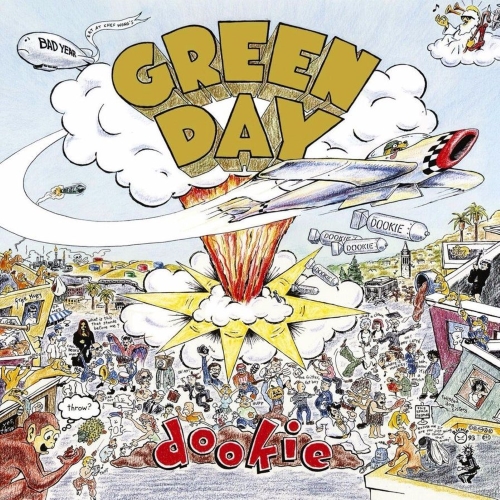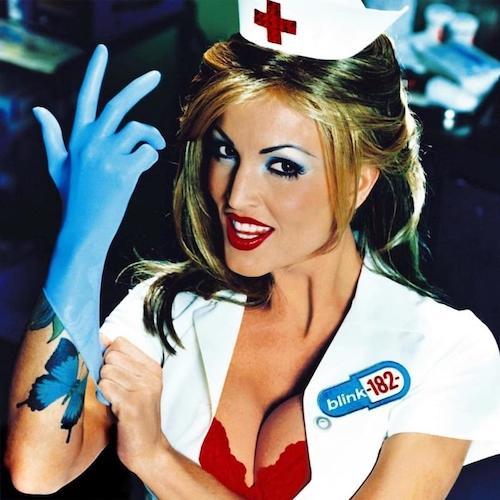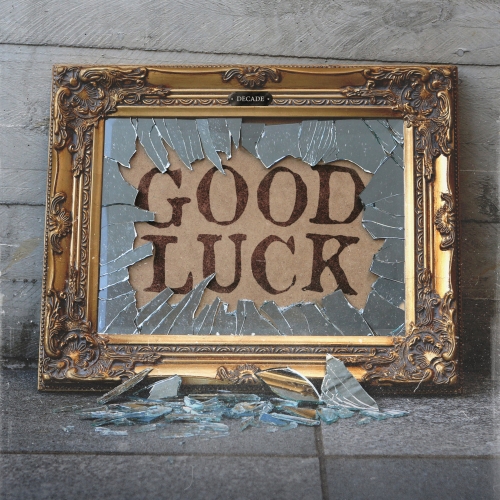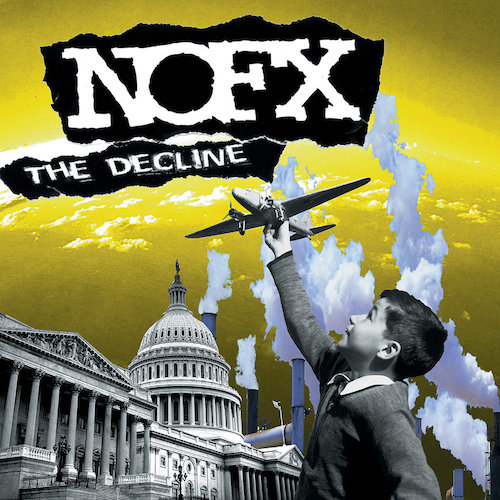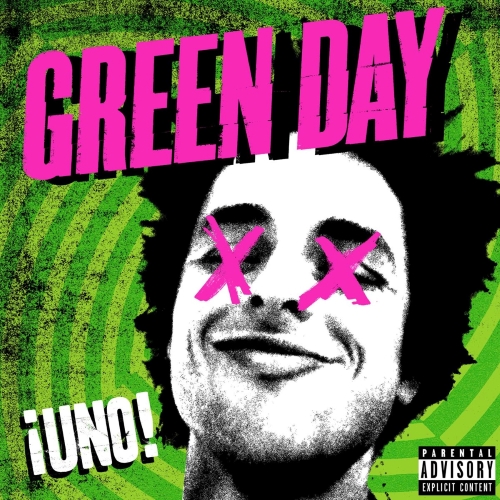

¡Uno!
Green Day
I really wanted to cover a Green Day record but they have so many records that I love, it was hard to pick. So I decided to cover six. In the first part of this series, I'll be looking back at the first three records the band did for Reprise, their introduction (much to the punk community's chagrin) to the mainstream. In the second part, I will take a look at a later time in the band's career that was particularly prolific. Of course, I'm talking about the ¡Uno!, ¡Dos!, ¡Tré! trilogy. I hope you enjoy reading my thoughts on these six records.
After releasing their two most ambitious and thematic records, American Idiot and 21st Century Breakdown, Green Day essentially closed the chapter on epic rock operas and went back to writing simple, three chord, power pop-punk tunes. And they wrote a ton of them. Thirty-seven in total; a creative and prolific spurt the band likely hasn't had since the Nimrod sessions. Instead of whittling this down to one album, the trio decided to release nearly everything, a complete document across three albums. The return to form didn't exactly receive the most glowing reviews or reception, but in my opinion, the results were mostly good. The songs have a classic, power pop leaning, reminiscent of the band's Foxboro Hot Tubs project, except with less intentional riff biting. This direction is also bolstered by some great production. It has a modern punchiness and clarity, but the guitars are less saturated in distortion and the vocals are often treated with this great slap-back delay. A nice bridge between current and vintage.
While all three records are certainly connected, I feel that each collection has its own unique personality. In the case of ¡Uno!, the tracklist features some of the more direct and songwriting-focused songs across the whole series. This is perhaps why this first instalment is my least favourite. Green Day can still write great, catchy songs as evidenced by the first four tracks here, but the band are unable to maintain that level of quality for the rest of the record, and even stumble embarrassingly at a few points. Kill the DJ for example, despite having an instrumental with a lot of swagger, has one of the most tiresome, asinine, and frankly, trash choruses across the band's entire career. It ruins everything good the track has going for it. Somehow though, the first single Oh Love, manages to be even worse. The tempo is a little too slow causing the performances to feel a little stiff, and the chorus melody has this majestic quality that sounds really corny.
As I said though, Green Day does put their best foot forward. Nuclear Family has a fantastic chorus, Stay the Night has a sweet sentimentality to it, and Carpe Diem, my favourite on the record, has a great chord progression that steps up and steps down on alternating phrases that contributes a great deal to the rallying and high-spirited nature of the song. Let Yourself Go is the most raucous the band gets on this record. The snotty, punk rager that is not interested in anything anyone has to say. The message of the tune can be boiled down to this: save your breath and mind your own business, simple as that. As for everything else on ¡Uno!, it's just alright. Nothing as bad as the two songs I previously mentioned, but nothing to write home about either. It's not the most promising start, but thankfully we see a bit of a shift on ¡Dos!.
6.7
Standouts: Nuclear Family, Carpe Diem, Let Yourself Go
Pop-Punk, Power Pop (2012) Reprise. Reviewed March 19th, 2022


¡Dos!
Green Day
I really wanted to cover a Green Day record but they have so many records that I love, it was hard to pick. So I decided to cover six. In the first part of this series, I'll be looking back at the first three records the band did for Reprise, their introduction (much to the punk community's chagrin) to the mainstream. In the second part, I will take a look at a later time in the band's career that was particularly prolific. Of course, I'm talking about the ¡Uno!, ¡Dos!, ¡Tré! trilogy. I hope you enjoy reading my thoughts on these six records.
¡Dos! takes that power pop direction the last instalment explored and pours a few pints on it, engulfs it in cigarette smoke, and occasionally slips it a tab of LSD. It's messy, disheveled, rock-n-roll, and I think the collection is all the more interesting for it. The best track on this record, without a doubt, is Baby Eyes. In the lyrics, I'm seeing images of a sweet and innocent person who may also be a stone-cold assassin who takes no mercy. This two-sided character is portrayed so well musically by contrasting an intro section that relays danger with the more major sounding verses. The vocal harmonies on this track are also killer. There's also some pretty energetic garage blues on the tracks Makeout Party and Lady Cobra. I would say they are sort of similar to The White Stripes' material pre-Elephant.
That same intensity, albeit with a slightly different flair, is brought to Wow! That's Loud as well. I love it for the searing guitar lead that hits your face right from the very beginning. I also love how the verses just mash away on a single chord as Billie Joe Armstrong delivers a vaguely classic sounding vocal melody. And lastly, the song has an extended outro where the drums get busier and busier, until Tré Cool unleashes this fury of triplet rolls all over the kit. On a calmer, more sentimental note, the last highlight for this record is definitely Stray Heart. The verses are pretty subdued with a great bassline from Mike Dirnt and some occasional ringing, jangly chords. There's a little pre-chorus section where by the end, everything just stops and Armstrong's vocals just hang in the void. Then, a quick little build-up sends us right into the chorus, which is super catchy; probably the strongest chorus on the whole record.
The rest of the record is pretty consistent but there is one glaring issue, and that's the song Nightlife. The track has this seedy, after hours vibe where Armstrong woozily slurs his words together, barely pulls his melody together, and his vocals are doubled up and distorted. It's not the most pleasant sound and maybe intentionally so. However, that's not the problem really. The problem is these tacky rap verses delivered by a seductive female. This track boasts lyrical gems such as "hope there's more in your pants than a bus route" or "gonna make a move before I get bored if you wanna explore my vocal cord." Add in a few tiresome lyrical clichés about devils on shoulders, and low-hanging euphemisms, and you've got yourself one truly horrible track. Thankfully, Wow! That's Loud follows to save this album from nearly irredeemable depths. Despite, this major misstep, ¡Dos! still turned out to be a more fun, titillating experience than the first batch of tracks. Although, Green Day still saves the best for last.
7.1
Standouts: Stop When the Red Lights Flash, Stray Heart, Baby Eyes, Wow! That's Loud
Pop Punk, Power Pop (2012) Reprise. Reviewed March 19th, 2022


¡Tré!
Green Day
I really wanted to cover a Green Day record but they have so many records that I love, it was hard to pick. So I decided to cover six. In the first part of this series, I'll be looking back at the first three records the band did for Reprise, their introduction (much to the punk community's chagrin) to the mainstream. In the second part, I will take a look at a later time in the band's career that was particularly prolific. Of course, I'm talking about the ¡Uno!, ¡Dos!, ¡Tré! trilogy. I hope you enjoy reading my thoughts on these six records.
Green Day clean themselves up a bit for the last instalment and return to a sound that is much more polished. Unlike ¡Uno! though, this set is much more grand and ambitious; leaving a point of finality to this journey. For the first time (if I recall correctly), we get some additional instrumentation right at the very beginning. The somewhat epic ballad that kicks off the last record in the set packs soft horns, plucky pianos, and strings within its runtime. It even has a nice key change at the end, and there's fewer things more epic than a key change. Later on, we get Dirty Rotten Bastards, which is a multi-phased, linear rock odyssey, similar to the lengthy tracks from American Idiot. There's an upbeat section towards the middle that gets me pretty hyped up, even more so when a bass solo replaces the vocals the second time it comes around. The song keeps building energy with a rippin' guitar solo that eventually gives way to a fiery conclusion to this section in which everyone is firing on all cylinders.
There's some other fantastic moments spread out all over this record. For example, there's the spectacular ending of 99 Revolutions, an otherwise slightly corny anthem that is reminiscent of material from 21st Century Breakdown. Tré Cool plays a galloping snare roll as Bille Joe Armstrong's vocals soar over sustained chords. With a gnarly rock scream, Armstrong launches another epic, rock climax. I also love the oddly timed riff on 8th Avenue Serenade which serves as a really strong hook, especially when later doubled with some soft 'oohs.' Another great moment is Mike Dirnt's vocal spot on Sex, Drugs, and Violence. It's a shame Dirnt doesn't get more opportunities to sing as I find his voice compliments Armstrong's quite a bit. Oddly enough, my favourite moment is the sentimental Amanda. It's a sappy ballad with a great vocal melody, but it has an edge to it with it's peppy tempo and driving drums. I really love the way the seventh chords colour the chorus, and I also love how the chords change from legato to more staccato just before the bridge. There's also a line in this song that sticks with me. "Is this some kind of love, that only hate would understand?" Armstrong asks, which I think is telling of just how deep his feelings go with this person he's singing about. I'm of the opinion that we tend to hate more passionately than we love, meaning that I am interpreting this to mean that Armstrong's infatuation could rival any level of hate he could possibly exhibit.
Unlike the last two installments, there really isn't a glaring dud on this record. I'm not super crazy about the ballads on this record, Brutal Love, Drama Queen, and The Forgotten, but they are produced immaculately and well written. They just so happen to not be my cup of tea. Speaking more generally of the collection, I think these three records are strong late-career offerings from the band, perhaps better than what many would give them credit for. Could they have gone through the typical album process and selected all the best tracks to make one amazing record, or even double record? Sure. But there's something quite admirable about just putting everything out there, for better or worse. I look at it as an intimate uncovering, a complete document of what the band was thinking and feeling during that period of their career.
7.6
Standouts: 8th Avenue Serenade, Amanda, Dirty Rotten Bastards
Pop Punk, Power Pop (2012) Reprise. Reviewed March 19th, 2022



